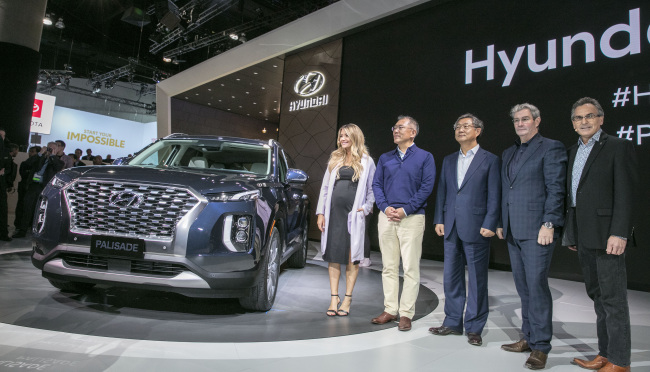Trump’s tweets on auto tariff further squeeze Korean carmakers
By Cho Chung-unPublished : Nov. 29, 2018 - 16:38
US President Donald Trump’s renewed threats of a tariff on imported vehicles have raised a red flag to South Korean carmakers already suffering from declining production in and out of the country, amid growing protectionist moves and fierce competition.
The US president on Wednesday tweeted, in response to General Motors’ massive restructuring plan, that the US carmaker would not have to shut down plants in its home county if the same amount of tariffs were applied, referring to the “chicken tax” that has been imposed on a light truck.
“The reason that the small truck business in the US is such a go-to favorite is that, for many years, tariffs of 25 percent have been put on small trucks coming into our country. It is called ‘chicken tax,’” Trump said.
Since the 1960s, a 25 percent tariff has been levied on small trucks imported from Europe in retaliation to West German tariffs on US poultry.
The Trump administration is reviewing a plan to levy fresh tariffs on imported cars, which experts say targets cars from the EU, Japan and South Korea.
The US president on Wednesday tweeted, in response to General Motors’ massive restructuring plan, that the US carmaker would not have to shut down plants in its home county if the same amount of tariffs were applied, referring to the “chicken tax” that has been imposed on a light truck.
“The reason that the small truck business in the US is such a go-to favorite is that, for many years, tariffs of 25 percent have been put on small trucks coming into our country. It is called ‘chicken tax,’” Trump said.
Since the 1960s, a 25 percent tariff has been levied on small trucks imported from Europe in retaliation to West German tariffs on US poultry.
The Trump administration is reviewing a plan to levy fresh tariffs on imported cars, which experts say targets cars from the EU, Japan and South Korea.

According to reports, the US Department of Commerce has already drafted a report that recommended the president impose a 25 percent tariff on imported cars, except for those from Canada and Mexico. The conclusion of the Commerce Department’s study of auto imports has to be presented to Trump by February. The US president would then have 90 days to take action.
Korean carmakers have been voicing concern that the fresh auto tariff will hit auto shipments to the US -- their second-largest foreign market. As of last year, Korean carmakers -- Hyundai, Kia, GM Korea and Renault Samsung -- exported a combined 850,000 units valued at around $14.5 billion. Shipments to the US accounted for 21 percent of cars manufactured in Korea and 33 percent of all exported vehicles.
The imported car tariff, if imposed, will further drag down the number of vehicles manufactured here to 3.26 million units a year and will have a spillover effect on steelmakers and petrochemical companies, which the nation still heavily relies on for growth.
Industry insiders say that Hyundai and Kia might have to increase auto production at their plants in the US and Mexico while reducing the number here. Other local units of GM and Renault will be given less orders for the US from its headquarters, they added.
Korea’s largest carmaker Hyundai Motor has been asking the Trump administration to exclude South Korean cars from the fresh auto tariff, as it would constrict both the production and sales of cars shipped to the US and increase the financial burden on customers there.
South Korean President Moon Jae-in also asked his US counterpart to exempt South Korean carmakers from the auto tariff, but there has been no response from the US yet.
Meanwhile, SsangYong Motors, which initially planned to enter the US market around 2020, declined to comment on the impact of the Trump administration’s auto tariff and said that it has no concrete plan yet to build a plant in the US or to export vehicles manufactured here.
By Cho Chung-un (christory@heraldcorp.com)



![[AtoZ into Korean mind] Humor in Korea: Navigating the line between what's funny and not](http://res.heraldm.com/phpwas/restmb_idxmake.php?idx=644&simg=/content/image/2024/04/22/20240422050642_0.jpg&u=)

![[Exclusive] Korean military set to ban iPhones over 'security' concerns](http://res.heraldm.com/phpwas/restmb_idxmake.php?idx=644&simg=/content/image/2024/04/23/20240423050599_0.jpg&u=20240423183955)

![[Herald Interview] Why Toss invited hackers to penetrate its system](http://res.heraldm.com/phpwas/restmb_idxmake.php?idx=644&simg=/content/image/2024/04/22/20240422050569_0.jpg&u=20240422150649)
![[Graphic News] 77% of young Koreans still financially dependent](http://res.heraldm.com/phpwas/restmb_idxmake.php?idx=644&simg=/content/image/2024/04/22/20240422050762_0.gif&u=)







![[Exclusive] Korean military to ban iPhones over security issues](http://res.heraldm.com/phpwas/restmb_idxmake.php?idx=652&simg=/content/image/2024/04/23/20240423050599_0.jpg&u=20240423183955)



![[Today’s K-pop] Ateez confirms US tour details](http://res.heraldm.com/phpwas/restmb_idxmake.php?idx=642&simg=/content/image/2024/04/23/20240423050700_0.jpg&u=)